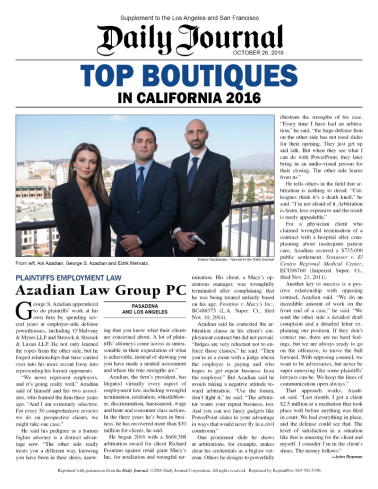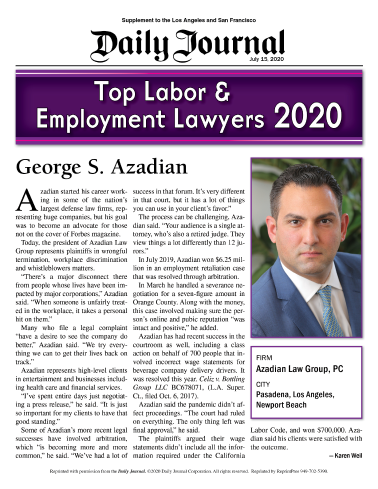Ask a Wrongful Termination Lawyer: Can My Employer Require I Get A COVID-19 Vaccine?
Ask a Wrongful Termination Lawyer: Can My Employer Require I Get A COVID-19 Vaccine?
You may be wondering if it is “legal” for your California employer to mandate the COVID-19 vaccine as a condition of employment. The short answer is “yes” — an employer can mandate the COVID-19 vaccine for employees.
On December 16, 2020, the Equal Employment Opportunity Commission (EEOC) updated its COVID-19 guidance including exceptions employers must consider if they adopt a mandatory vaccination policy. https://www.eeoc.gov/wysk/what-you-should-know-about-covid-19-and-ada-rehabilitation-act-and-other-eeo-laws
The EEOC recommends employers follow the most current information from public health authorities such as the Centers for Disease Control and Prevention (CDC). As new information becomes available the CDC continually updates employer COVID-19 related guidance, which provides recommendations focused on mitigating viral spread and maintaining a safe workplace.
On July 26, 2021, the U.S. Department of Justice (DOJ) took the position that the Food, Drug, and Cosmetic Act (FDCA)—which authorizes an “emergency use authorization” (EUA) for a vaccine—does not prohibit entities, including employers, from requiring a vaccine even if authorized for emergency use only.
The DOJ’s legal opinion can be found at http://cdn.cnn.com/cnn/2021/images/07/26/dojvax.pdf
For these reasons, it is likely that employees may be required to get the vaccine or risk termination of employment.
Employers can exclude from the workplace and even terminate any employee who refuses the vaccine, with two potential exceptions: (1) a disability or medical condition preventing the employee from being vaccinated; and (2) being opposed to the vaccine based on sincerely held religious belief. If an employee refuses vaccination for either reason, employers with 5 or more employees, are required to provide a reasonable accommodation unless it would pose an undue hardship, meaning significant difficulty or expense.
There are numerous medical conditions that may prevent individuals from obtaining the vaccine based on the advice of the individuals’ doctor. Some of the most common conditions include, allergic reaction to any component of the vaccine, allergic reaction to the first dose of the vaccine, immunocompromised individuals whose doctors believe the vaccine should not be provided, and pregnant or breastfeeding individuals whose doctors believe the vaccine should not be provided.
In these situations, the employee should likely obtain a doctor’s note stating that due to an underlying medical condition, the employee cannot be vaccinated.
Providing such a doctor’s note should trigger the interactive process where the employer and employee will need to determine if there is a reasonable accommodation that can be provided to the employee. It remains to be seen what forms of reasonable accommodations may be offered by employers. Some likely accommodations may or may not be reasonable based on the specific job at issue. It is possible that such accommodations may include: working remotely; weekly COVID-19 testing; an enclosed and socially-distanced work area, and wearing a mask.
An employee may also contend that a sincerely held religious belief prevents them from taking the vaccine. Most religions do not have any prohibition against vaccinations, however some have considerations regarding vaccination in general or specific vaccine ingredients. A number of religions have theological objection to vaccination, including Christian Science.
Employers are required accommodate those religious beliefs that are “sincerely held.” Because the definition of religion is broad and protects beliefs, observances, and practices with which the employer may be unfamiliar, the employer should ordinarily assume that an employee’s request for religious accommodation is based on a sincerely held religious belief. If, however, an employee requests religious accommodation, and an employer has an objective basis for questioning either the religious nature or the sincerity of a particular belief, observance, or practice, the employer would be justified in seeking additional supporting information.
EEOC Guidance on Religious Discrimination may be found at https://www.eeoc.gov/laws/guidance/section-12-religious-discrimination#h_9546543277761610748655186
In any event, the Employer may argue that accommodating such employees is not reasonable or places an undue burden on the employer. In a case decided by the United States District Court for the District of Massachusetts, the Court held that it would be an undue burden for the employer (a hospital) to accommodate an employee whose religious beliefs (Nation of Islam) prevented the employee from receiving the flu vaccine, which contained pork byproducts. This means that the employer was within its rights to terminate the employee based on her refusal to receive the flu vaccine. Robinson v. Children’s Hosp. Bos., Civil Action No. 14-10263-DJC, 2016 U.S. Dist. LEXIS 46024 (D. Mass. Apr. 5, 2016). Indeed, a number of cases have held that healthcare workers can be terminated for refusing the flu vaccine.
Ask a Wrongful Termination Lawyer: Can My Employer Require I Get A COVID-19 Vaccine?
Related Blog Posts
Experiencing wrongful termination can be a stressful and challenging ordeal. If you believe you were unlawfully terminated from your job...
Read MoreFacing wrongful termination during a probationary period can be a disheartening experience for any employee. The uncertainty and frustration that...
Read MoreIn the intricate world of employment law, the significance of Non-Compete Agreements cannot be overstated. These legally binding contracts have...
Read MoreTypes of Employment Cases We Handle in California
The following presents an overview of the broad range of employment law cases that our employment law attorneys are experienced at overseeing and favorably resolving.
Wrongful Termination
Wrongful Termination Lawyers in Los Angeles, CA Attorneys at Azadian Law Group who have filed wrongful termination lawsuits acknowledge that unfair termination can significantly impact an employee’s life. It can…
Age Discrimination
Age Discrimination Lawyers in Los Angeles, CA Azadian Law Group, PC regularly represents clients throughout Los Angeles, CA, who are the victims of age discrimination in the workplace. At Azadian…
Pregnancy Discrimination
Pregnancy Discrimination Lawyer in Los Angeles, CA At Azadian Law Group, PC, our pregnancy discrimination lawyer in Los Angeles, regularly represents clients who are the victims of pregnancy discrimination in…
Sexual Harassment
Sexual Harassment Attorney in Los Angeles, CA The Los Angeles Sexual Harassment Lawyers at Azadian Law Group, PC know that in today’s modern era some people often make the mistake…
Racial Discrimination
Racial Discrimination Lawyers in Los Angeles, CA Azadian Law Group, PC regularly represents clients throughout Los Angeles who are the victims of racial discrimination at work. The Los Angeles Race…
Disability Discrimination
Disability Discrimination Attorneys in Los Angeles, CA There is a misconception that disabled people do not want to work or that disabled individuals simply cannot or will not be as…
Praise from Our Clients
Who We Represent
At Azadian Law Group, we are dedicated to upholding the rights and interests of employees in the workplace. Our expertise in employment law positions us as staunch advocates for those facing unjust treatment in their professional environments.
Whether combating workplace discrimination, addressing unfair termination, or negotiating equitable compensation, our team is committed to ensuring that every employee we represent is treated fairly and respectfully under the law.

Step 1
Explore our comprehensive range of legal services to find the specialized support you need.
Step 2
Arrange a free initial meeting with our experts to discuss your legal situation.
Step 3
Receive a custom strategy specially created for your case by our legal experts.
Call Us Now 213-229-9031
Tell Us Your Story
Speak out for justice. Your story can be the start of a new chapter of workplace fairness.




